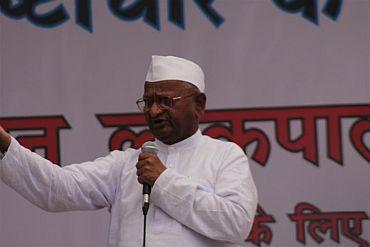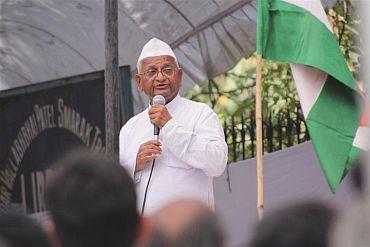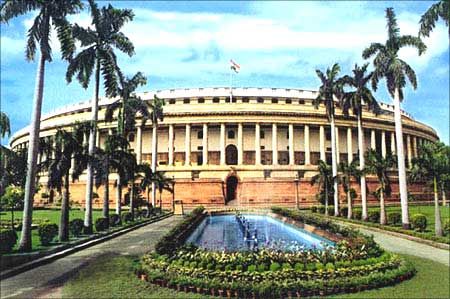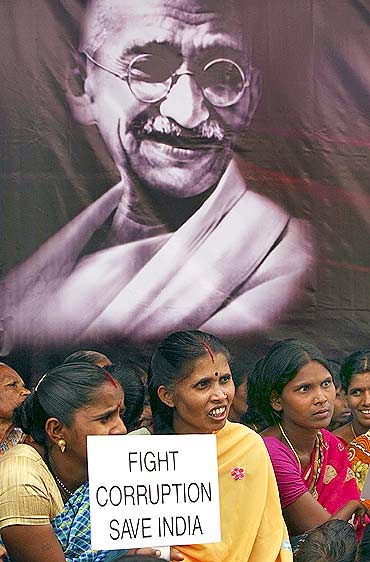Colonel Anil Athale (retd)
A powerful campaign has been launched against social activist Anna Hazare and the movement he led. 'Anti-democratic', 'fascist' are some of the adjectives hurled at him. There is a less than subtle attempt to paint him a Hindu fundamentalist, writes Colonel Anil Athale (retd).
When he broke his 96-hour fast to force the government to constitute a joint committee to draft a tough anti-corruption bill, Anna Hazare was realistic; he candidly admitted that this was just the beginning and a long battle lay ahead.
Even before the ink on the government gazette could dry, a powerful campaign has been launched against him and the movement he led. 'Anti-democratic', fascist' are some of the adjectives hurled at him.
There is a less than subtle attempt to paint him a Hindu fundamentalist (for displaying the image of Bharat Mata on the stage) and the fact that the 'Vande Mataram' slogan was raised! The critics seem to forget that neither of these symbols are Hazare's invention; it is our legacy from freedom struggle!
Several 'veteran' columnists and some news channels have raised a spectre of anarchy and 'dictatorship by the Lokpal, never mind the contradiction in the two concepts.
As someone who wholeheartedly supports this movement and someone who had a brief association with Hazare, the author wishes to set the record straight and also alert the citizens of the formidable opposition that is building up to thwart attempts to cleanse our society from the menace of corruption.
I wish to add a personal note since it is of some relevance to the matter under discussion. It was in 1993 when in the wake of the Mumbai bomb blasts and involvement of customs officials taking bribes and turning a blind eye to the smuggling of RDX, the explosive used in the blasts, that I got involved in the anti-corruption movement then being spearheaded by G R Khairnar, a deputy municipal commissioner of Mumbai.
S S Tinaikar, an upright former municipal commissioner and some other retired civil servants as well as Hazare had taken the lead. I vividly remember that Khairnar threatened an agitation, Mumbai bandh etc.
When my turn came to speak, I mentioned clearly that strikes will not be effective and what we need is an agitation to frame laws and create institutions to fight the menace. I had agreed to join the movement since I felt that corruption had crossed all bounds and had become a threat to national security.
The issue has become worse today and Hazare is right in saying that it is a bigger threat than Pakistan. Even the 2G spectrum scam has security dimension since enemy countries have gained access to our telecom infrastructure.
The Khairmar-led agitation was soon hijacked by the opposition Bharatiya Janata Party-Shiv Sena combine who came to power in elections held soon thereafter. But once in power, these same parties who benefitted from the movement did nothing to stem the corruption.
...
'Paid media will be used to discredit the movement'
Not only that, the BJP-Sena government also targetted Hazare by launching false cases against him. I paid a price since henchmen of a powerful Maharashtra politician hounded me out from a teaching position at the university!
Two clear lessons emerge from the experience of 1993 -- politicians will attempt to hijack the agitation and do nothing about corruption once they come to power. Second and equally important is that soon the government aided and abetted by the bureaucracy will launch a campaign to throw dirt on the persons leading the movement.
Paid media and journalists will be used to discredit the movement. The first salvo has already been fired by a central minister saying that the Lokpal will not solve the problems of poor people, such as lack of food, health support or education!
If the movement has to succeed then the educated and middle-class professionals involved have to go to the grassroots and poor and educate them how price rise and their poverty is linked to thousands of crores looted and kept in foreign banks and affects them.
Every poor person knows that he has to pay a bribe to get his Below Poverty Line card and authorised rations at a subsidised price. The poor are not idiots and can see through the charade of leaders who try to portray corruption as an issue only for the middle classes.
This will however involve hard work and not mere sending of SMSes, although today even the so called 'certified poor' have a mobile. So, the electronic campaign if conducted in local language can mobilise even the poor (who incidentally are the ones who vote).
...
'The Constitution is open to change'
Some commentators have criticised this movement as anti-democratic since it has 'insulted' the Constitution and violated the 'sovereignty' of Parliament. Suggesting changes is not an insult to the Constitution, as some misguided people have been led to believe (who went on to stone the house of one of the supporters of the movement).
The Constitution is open to change and has been amended at least 60 times! Creation of new institutions under the very Constitution is not an insult but strengthening of the Constitution.
It is amusing to see educated people talking of 'sovereignty' of Parliament! In Indian scheme of things Parliament is a creature of the Constitution and not sovereign like the British Parliament. In any case, the anti-corruption movement is asking that very Parliament to enact a law to deal with corruption. The feigned insult by politicians is entirely misplaced.
Some elected representatives have also questioned the 'self-appointed' leaders right to speak for the people since they claim monopoly of that. A simple calculation in our 'first past the post' and winner-takes-all system will show how hollow this claim is.
On an average around 60 people people vote and in multi-cornered contests (which is the norm) the winner seldom gets more than 40 to 45 per cent of the votes cast. This would mean that our elected representatives in reality are supported by just 25 per cent of the total electorate.
Or put the other way round, close to 75 per cent people are against the 'elected' leader. Yes, this is an issue of electoral reforms that needs to be addressed, but suffice it to say that elected representatives should be little more humble when they lay sole claim to speak for people.
Even more laughable is a comment made in a leading newspaper in its op-ed columns this week. The worthy author opposes a 'Lokpal-like' institution by claiming that this will lead to delays in project implementation!
Does this worthy want bridges or roads by corrupt with more sand than cement? The whole world saw how the over-bridge built during the infamous Commonwealth Games collapsed within a day of construction!
The point at issue is not this rubbish dished out by a columnist, but that a national daily thought it fit to publish it! Just goes to show how strong the corrupt lobby is.
...
The uniqueness of Anna Hazare
Anna is not an armchair reformist. In less than 10 years time he has transformed his village of Ralegan Siddhi into a developed village. Be it ecology, literacy, water conservation, renewable source of energy, health or education, his efforts have achieved all the goals set by planning commission.
It is this solid achievement that is Anna's strength.
Again, injecting a personal note, it was in 1994-95 that Indian Initiative for Peace, Arms control and Disarmament decided to do something about the socio-economic problems in Kashmir that fuelled unrest.
At the behest of the late Navalmal Firodiya (owner of Force Motors and associate of M K Gandhi, the original) we met with Anna at the former's residence and formulated plans to inject horticulture, computers and modern education in Kashmir.
It was a very small effort with indifferent results, but it acted as a spark nevertheless. We were very keen to implement the Ralegan Siddhi model in Kashmir's mountainous areas. But as Anna rightly pointed out, the leadership for these initiatives has to come from the locals.
It is still possible to bring in people from Kashmir to Ralegan Siddhi and motivate them to duplicate Anna's model of village development.
The tragedy of Maharashtra is that while Madhya Pradesh and Karnataka sought his help and advice, he was shunned by the politicians in Maharashtra itself. The main reason was that the politicians were afraid that if his model is implemented they will lose their co-operative empires and if poverty is eradicated then they will lose a potent electoral issue.
In Maharashtra, the culture of 'Khao aur bant ke khao' (steal but share) has taken such strong roots that Anna is a misfit in the state. The suspicion that politicians have of Anna and his idealism cuts across party lines.
...
'The obstacles are indeed formidable'
The bureaucracy and politician nexus that is running scared of Anna's movement and the Lokpal Bill have been giving the argument that corruption and greed is part of human psyche. Many years ago, another prime minister of our country had dismissed the anti-corruption movement by saying that 'Corruption is a global phenomenon'. We all know what happened a few years later.
Chanakya in his Arthashastra says that finding out whether an official of the king who is looking after the treasure is stealing from it or not is as difficult as finding out if at any given moment a fish is drinking water!
The obstacles are indeed formidable. Public memory is short. An appeal of a former chief minister convicted in a case is pending for the last 10 years? In a new trick, to delay the legal process the police have taken to submitting chargesheets that run into tens of thousands of pages!
Another trick that is being practiced is to give a list of thousands of witnesses. Begin this process at the lowest judicial level and rest assured the charged individual will die a natural death before his case is finally disposed off.
In the meanwhile, under the pretext of 'case still pending' he continues to enjoy normal life and his ill-gotten gains, becomes a minister and lives happily till death!
If people are today demanding that corruption cases be decided in two years is it fascist?
Finally, as an ex-armyman, the author is indeed proud of what a former soldier such as Hazare has achieved. The civil society ought to at least look at the armed forces for controlling corruption.
Sure there have been quite a few cases of corruption that have come to light as regards armed forces personnel. But the crucial difference between these and politico-bureaucratic corruption is swift trial and deterrent punishment!
Be it the Tehelka scam, Sukna scam or others, the guilty have been tried and punished! While on the civic street an actor convicted of keeping an illegal weapon and sentenced to six years roams around free -- on an indefinite bail!
In 1947, we think we got independence but the world and the British called it 'transfer of power'. To date we continue to use the provisions of the Telegraph Act of 1885 or Defence of India Rules of 1942 or even the Official Secrets Act of 1923!
It is time to begin the second independence movement, and Anna has taken the first step on this long journey.
Colonel Anil Athale (retd), is coordinator of Initiative for Peace and Disarmament, Pune.






article